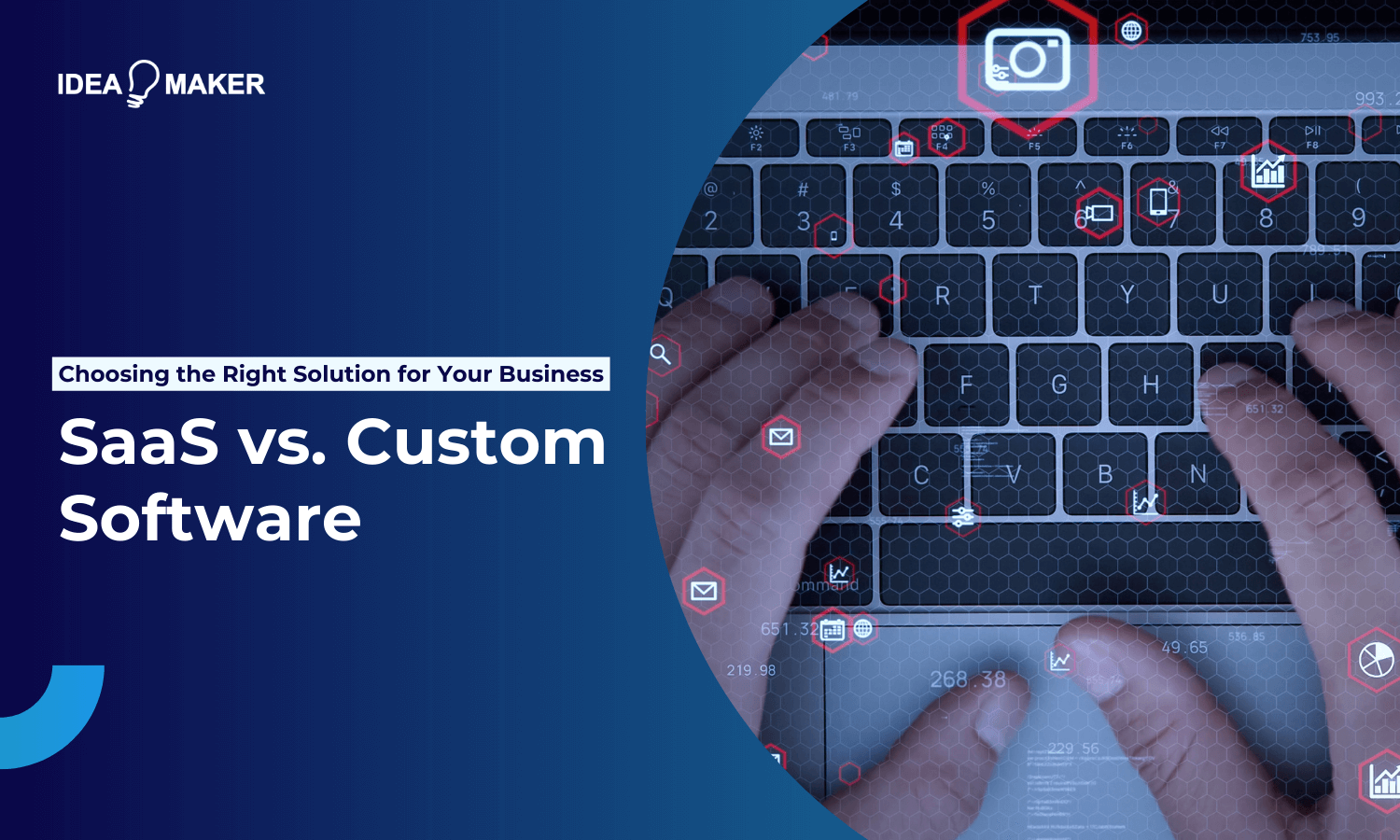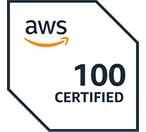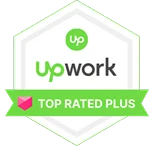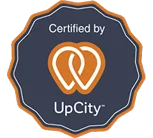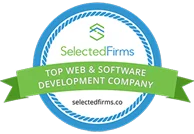Table of Contents
Choosing between software-as-a-service (SaaS) and custom software is a crucial decision for any business looking to implement new technology in their operations. While both options offer advantages, there are many key differences, especially in regards to cost structure, scalability, and security.
In this article, we provide a digestible comparison of SaaS and custom software to help you select the right solution for your business. By weighing factors like business size, goals, budget, and industry-specific needs, you’ll learn to determine which software type is better suited to your requirements. Keep reading to learn more.
What Is SaaS?
Software-as-a-service refers to cloud-based applications that can be accessed from any internet-connected device without requiring an installation. As the name suggests, SaaS applications aim to turn software into a service by employing a tier-based monthly subscription business model. For example, similar to how you might pay an accountant a monthly fee, you can also pay a monthly subscription fee for online accounting software.
What Is Custom Software?
Custom software refers to applications that are purpose-built with the needs and goals of a particular business in mind. These solutions provide tailored-made and niche functionality without unnecessary features that aren’t relevant to the business using the software. This makes custom software powerful, yet more lightweight, than generic software made for general business use.
Comparing SaaS and Customer Software
Now that you have a better understanding of SaaS and custom software, let’s take a deeper look at how the two compare in terms of cost, scalability, and overall capabilities. This will give you more insight into the pros and cons of each option, enabling you to confidently determine which software solution can better address your specific business needs.
Cost Implications
Both SaaS and custom software generally have high initial startup costs; however, the cloud-based nature of SaaS applications also entails ongoing server maintenance and hosting costs. Custom software, on the other hand, can be installed on local hardware without further cost, unless you pay for post-release support from your development team.
While it may seem that custom software is the more cost-effective option, this isn’t necessarily always the case. In fact, depending on your business needs, SaaS applications can be just as economical in the long run.
Scalability and Flexibility
Compared to generic off-the-shelf applications, both SaaS applications and custom software offer unrivaled scalability. However, if your SaaS platform has a large user base, updating and scaling it without interrupting the user experience could prove difficult. Fortunately, this can be mitigated by incrementally rolling out minor updates.
Custom software, conversely, is as scalable and flexible as you need it to be. For instance, when building your project, your development team can make considerations for future changes based on your specific requirements. The primary issue with custom software and scalability is that, unless it’s connected to a cloud server, bulk updating versions of the software can be challenging, as you’ll need to install updates across all devices that use the software.
Integration Capabilities
When it comes to integration, a key advantage of SaaS is that it can smoothly connect to other cloud-based systems. With custom software, integrating with legacy on-premises systems may require more effort. However, custom software can be tightly integrated at a deep level within your own internal workflows and data. So, for integrating across your own custom systems, custom software may have an edge.
Overall, both SaaS and custom software offer robust integration capabilities with your existing systems and operational processes. How well SaaS or custom software work in terms of integration is mostly down to the development team you partner with. While some integration won’t be possible due to a lack of API access from third-party applications, integration with most major systems should be relatively easy.
Advantages of SaaS Over Custom Software
It’s clear that SaaS and custom software are well matched, making choosing the right option for your business all the more difficult. So, to help you make up your mind, let’s start by exploring the advantages of SaaS over custom software.
Quick Deployment
From both a user and business perspective, SaaS is quicker to deploy than custom software, as they are uploaded to a cloud server and then accessible by any internet-connected device. This means your SaaS application, along with future updates, can be available within minutes of deployment.
Custom software, however, often needs to be installed manually across multiple devices. Additionally, because updated versions must be reinstalled, more checks are also required when deploying custom software.
Lower Upfront Cost
As we mentioned earlier, SaaS and custom software both have high initial costs. But, due to its flexibility, SaaS offers more options for minimum viable product (MVP) development, resulting in lower upfront expenses. The modular nature of SaaS also makes it easy to build on the MVP over time, meaning you can invest in more features once you’ve identified that your platform is profitable. This allows businesses to validate their SaaS idea before fully committing, significantly reducing risk.
Ease of Use
One of the main advantages of SaaS applications is that they are easy for end users to start using quickly. Because SaaS apps are cloud-based, users can access them from any internet-connected device without needing to install anything. The user interface is also designed to be intuitive and user-friendly, ensuring a seamless onboarding process. This simplicity and consistency ultimately helps users adopt the software with ease.
Ease of Maintenance
Being hosted on cloud servers means that SaaS applications offer easy maintenance options. Whether you want a new feature added or a bug fixed, all you have to do is liaise with your development team, who can update the platform remotely. Apart from testing the feature or updating upon release, there are no further steps needed once your developers are at work. New installs aren’t generally required either, as it’s done from a remote server. Consequently, all users get instant access to the updates without hassle.
Benefits of Custom Software
Now that we’ve addressed the advantages of SaaS applications, let’s take a look at the benefits of choosing custom software for your business.
Personalization
The possibilities with custom software are, for all intents and business purposes, endless. Custom software is not bound by the limitations of the internet technologies used for SaaS which, though still impressive, are restricted by WiFi speeds, browser security, and server capacity. This means you can build feature-rich software tailored to your exact business needs, from functionality to branding. With a high level of customization and interconnectivity with your existing systems and hardware, custom software is an excellent choice for businesses with growing internal teams.
Long-Term ROI
While SaaS applications have a more obvious way to generate revenue with their monthly subscription fees, generating long-term ROI is very much possible with custom software. For example, you can sell license keys for your software to grant new users access, essentially loaning the rights to use your software on a long-term basis. Unlike SaaS products that typically charge low monthly fees, selling license keys means you can charge high one-time or annual fees to quickly generate an ROI.
Control and Security
Custom software installed on your local system is typically more secure than SaaS platforms that service many users at once. This is because there are few, if any, incoming connections from external sources, meaning only a small group of users have access to the software.
What’s more, being installed on your internal business servers or hardware puts yet another barrier between your software and malicious outside parties. With custom software, you’re in control of everything, from where your software is stored to who uses it, making it a highly secure option. SaaS applications built by the right SaaS development company, however, can be just as secure.
Factors to Consider When Choosing One Over Another
Now that you understand the benefits of both SaaS applications and custom software, you’re in a good position to begin considering which is best for your business. But the truth is, in terms of power and capabilities, SaaS and custom software are well matched. This means your decision ultimately comes down to other business-related factors, including:
- Business Goals and Objectives: What you aim to achieve with your software and, crucially, who you aim to serve will impact whether SaaS or custom software is for you. For instance, if your objective is to deliver a service to a user base of people outside your organization, SaaS is the better option. However, if you’re looking for a tool suited to internal use, custom software is a wise choice.
- Budget Constraints: As previously discussed, both SaaS and custom software entail high initial startup costs, but both also stand to generate an ROI. However, if you have a tight budget, you’re better off choosing a SaaS platform, as an MVP is more easily updated later down the line.
- Future Growth and Adaptability: Due to its flexible, remote nature, SaaS takes the lead over custom software in terms of future growth and adaptability. Updates can be rolled out at will without any hardware updates, making SaaS platforms highly adaptable and noninvasive to user devices. It’s also more convenient to pay to upgrade cloud servers than to upgrade your own physical stack.
It may seem like SaaS is taking the lead over custom software, but it’s important to remember that each business is unique. While SaaS may be an excellent choice for some businesses, it’s not for all.
Suitability Based on Business Needs
To help you get a better idea of which type of software you need, here are some additional parameters to consider, from a macro perspective.
- Small vs. Large Businesses: SaaS is often a better fit for small businesses due to lower upfront costs and easier scalability, while large enterprises may benefit more from highly customized solutions.
- Industry-Specific Requirements: Certain industries like healthcare and finance have stringent compliance and security needs that may be better met through custom software with high configurability. Although SaaS can also be customized, it may require more effort.
Consider a Consultation With Idea Maker Before Making a Decision
When deciding between SaaS and custom software, it’s vital to carefully evaluate your unique business needs and priorities, as both options provide powerful capabilities. For instance, custom software allows maximum personalization to address niche requirements, while SaaS enables faster deployment and easier scaling.
Regardless of your chosen solution, partnering with the right development team is the key to success. Fortunately, at Idea Maker, we have expertise in both custom programming and SaaS development. Our development team can provide expert guidance and build the ideal software to meet your goals.
So, if you need help determining if SaaS or custom is right for you, schedule a free consultation today and take the first step in bringing your software vision to life.
